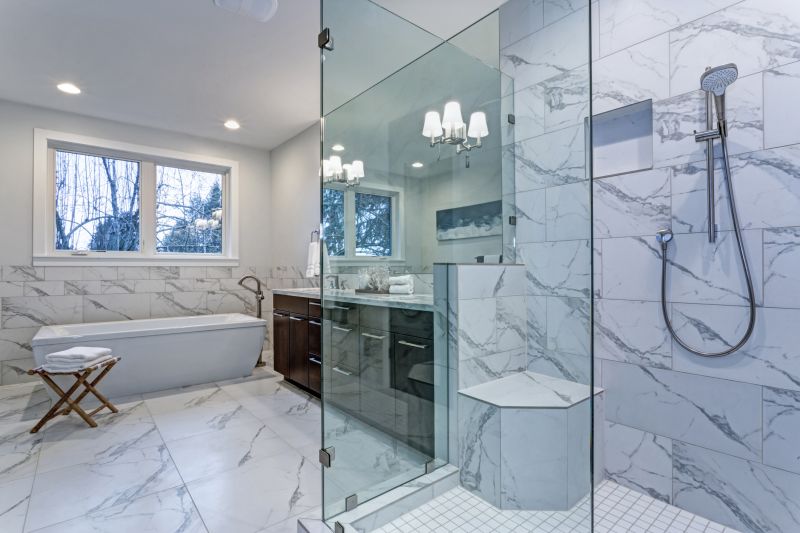Shower Tile Design Options
Welcome to Aberdeen Showers
Shower Tile Design Options
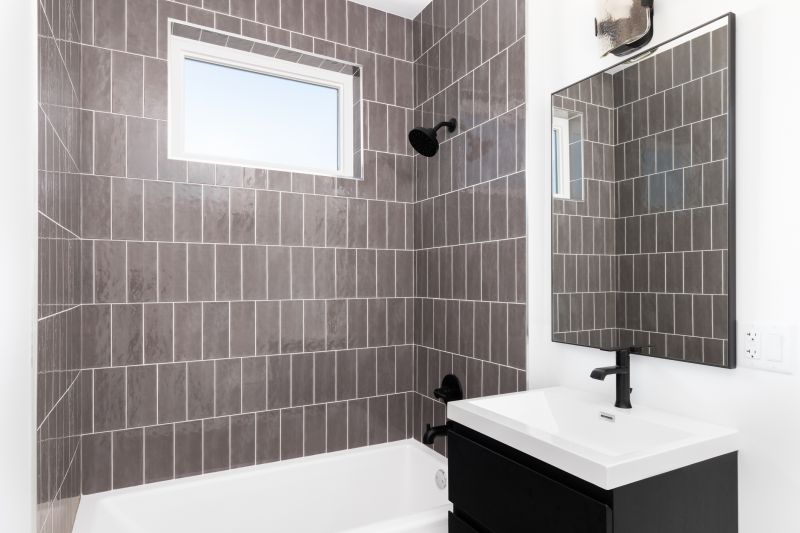
Exploring Shower Tile Design Options for Your Bathroom
When considering a bathroom remodel, one of the most impactful decisions homeowners face is choosing the right shower tile design. The variety of options available can seem overwhelming, but understanding the key considerations can help in making an informed decision. From materials and finishes to dimensions and upkeep, each aspect plays a crucial role in the final look and functionality of your shower space.
The choice of material is a fundamental consideration in shower tile design. Ceramic and porcelain tiles are popular due to their durability and water resistance. Natural stone, such as marble or travertine, offers a luxurious look but may require more maintenance. Glass tiles provide a modern aesthetic and can make a space feel larger, but they can be more challenging to keep clean.
Finish is another important factor, affecting both the appearance and practicality of shower tiles. Glossy finishes can create a sleek, modern look and are easy to wipe clean, but they might be slippery when wet. Matte finishes offer a more understated appearance and can provide better traction, making them a safer choice for wet areas.
Dimensions of the tiles can dramatically influence the perception of space within a shower. Large format tiles can create a seamless look with fewer grout lines, which can make cleaning easier. Smaller tiles, such as mosaics, offer more design flexibility and can be used to create intricate patterns or accent features.
Color and pattern are key elements of design that allow for personal expression. Neutral tones can create a calming and timeless environment, while bold colors or patterns can make a striking statement. Consider how the tile color and pattern will complement other elements in the bathroom, such as wall colors and fixtures.
Maintenance and upkeep expectations should also be factored into your decision. Some materials and finishes require regular sealing or special cleaning products to maintain their appearance and functionality. Understanding the care requirements of your chosen tiles can help ensure they remain in good condition over time.
Compatibility with existing features is crucial, especially in partial remodels. Consider how the new tiles will interact with existing flooring, wall colors, and fixtures. Achieving a cohesive look can enhance the overall aesthetic of the bathroom.
- Material: Ceramic, Porcelain, Natural Stone, Glass
- Finish: Glossy, Matte
- Dimensions: Large Format, Mosaic
- Color: Neutral, Bold
- Pattern: Simple, Intricate
- Upkeep: Low, High
| Material | Finish | Dimensions |
|---|---|---|
| Ceramic | Glossy/Matte | Large/Small |
| Porcelain | Glossy/Matte | Large/Small |
| Natural Stone | Matte | Variable |
| Glass | Glossy | Small |
Ceramic Tiles
Known for their versatility and durability, ceramic tiles are a popular choice for shower spaces. They come in a variety of colors and finishes, making them adaptable to any design style.
Porcelain Tiles
Porcelain tiles are dense and water-resistant, ideal for high-moisture areas. They are available in a wide range of styles and can mimic the look of natural stone or wood.
Natural Stone Tiles
Offering a unique and luxurious appearance, natural stone tiles like marble or travertine can enhance the elegance of a shower. However, they may require more frequent maintenance.
Glass Tiles
Glass tiles add a modern and bright touch to any shower design. They reflect light, making spaces feel larger, but may require more careful cleaning to prevent streaks.
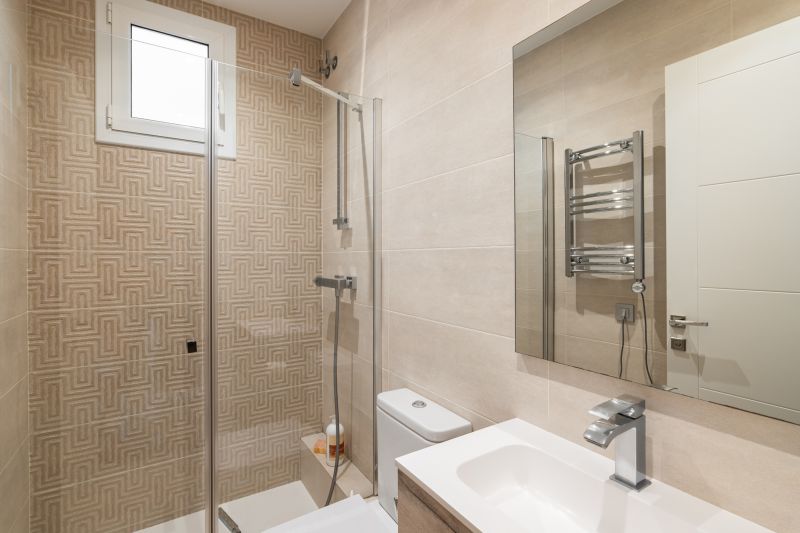
Ceramic Tiles
Versatile and durable, ceramic tiles suit various styles with many colors and finishes.
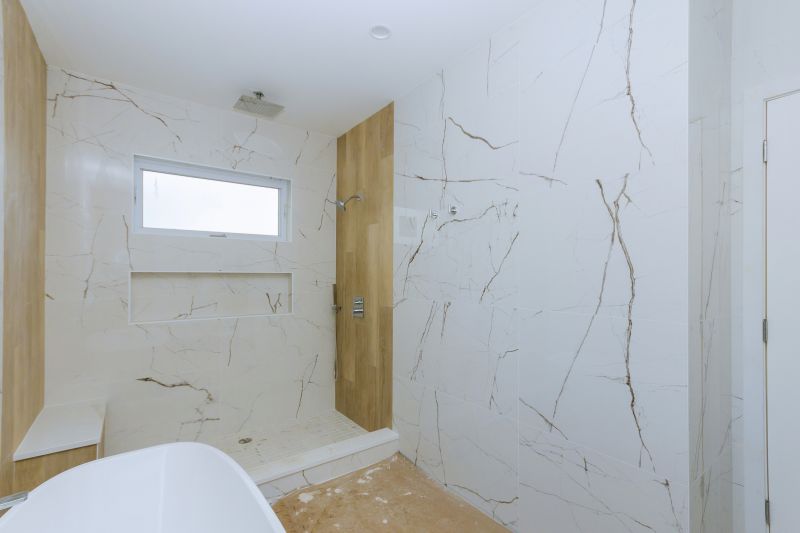
Porcelain Tiles
Dense and water-resistant, porcelain tiles mimic natural stone or wood.

Natural Stone Tiles
Luxurious natural stone tiles like marble add elegance but need more maintenance.
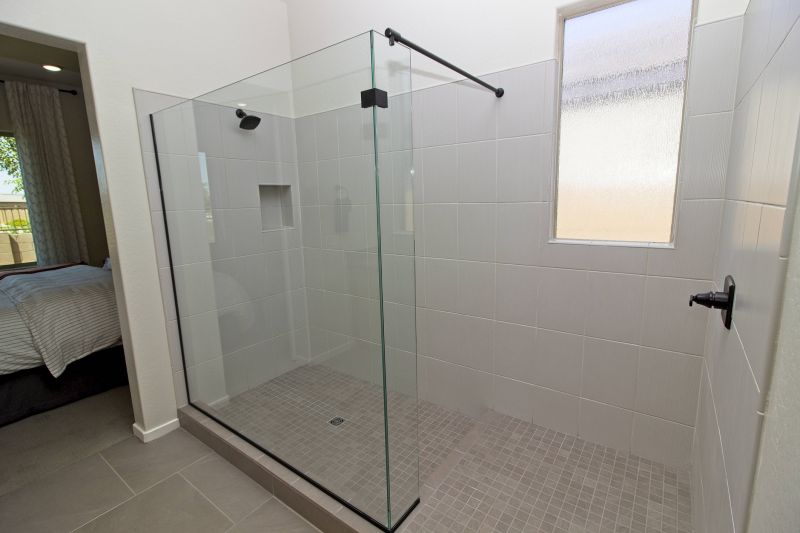
Glass Tiles
Modern and bright, glass tiles reflect light but need careful cleaning.
Exploring Material Choices for Shower Tile Designs
Understanding the Pros and Cons of Various Shower Tile Materials
When it comes to designing a shower, choosing the right tile material is crucial. The decision impacts not only the aesthetic appeal but also the functionality and maintenance of the shower. Homeowners have a plethora of options ranging from natural stone to modern ceramics, each offering unique attributes and benefits.
Ceramic tiles are a popular choice due to their versatility and ease of maintenance. They come in a wide range of colors, patterns, and finishes, making them suitable for various design preferences. Ceramic tiles are also water-resistant and durable, making them an excellent choice for wet environments like showers.
Porcelain tiles are another excellent option, known for their density and low water absorption rate. They are available in many styles, including those that mimic natural materials such as stone or wood. Porcelain is often favored for its strength and ability to withstand heavy use, making it particularly suitable for high-traffic bathrooms.
Natural stone tiles, such as marble, granite, and travertine, offer a luxurious and timeless look. These materials bring a unique character to the shower space, with each piece showcasing its own patterns and colors. However, natural stone requires more maintenance to prevent staining and damage from moisture.
Glass tiles are a contemporary choice, known for their sleek and modern appearance. They can add a touch of elegance and brightness to a shower, reflecting light and creating a sense of space. While visually appealing, glass tiles can be slippery when wet and may require more frequent cleaning to maintain their shine.
- Ceramic: Versatile, easy maintenance, water-resistant
- Porcelain: Dense, low water absorption, mimics natural materials
- Natural Stone: Luxurious, unique patterns, requires maintenance
- Glass: Modern, reflective, requires frequent cleaning
Ceramic Tiles
Ceramic tiles offer a wide range of design options and are easy to maintain, making them ideal for most shower designs.
Porcelain Tiles
Known for their durability and low water absorption, porcelain tiles are perfect for high-traffic shower areas.
Natural Stone Tiles
These tiles provide a luxurious look but require regular maintenance to prevent moisture damage.
Glass Tiles
Glass tiles add elegance and light to a shower space, though they may need more upkeep to maintain their appearance.
| Material | Finish | Dimensions |
|---|---|---|
| Ceramic | Glossy, Matte | Varied |
| Porcelain | Matte, Textured | Varied |
| Natural Stone | Polished, Honed | Varied |
| Glass | Glossy | Varied |
Ultimately, the choice of shower tile material should align with the homeowner's aesthetic preferences and practical needs. Each material offers distinct features that can enhance a bathroom's design while requiring different levels of care and maintenance. By understanding these options, homeowners can make informed decisions that will contribute to the beauty and functionality of their shower spaces.
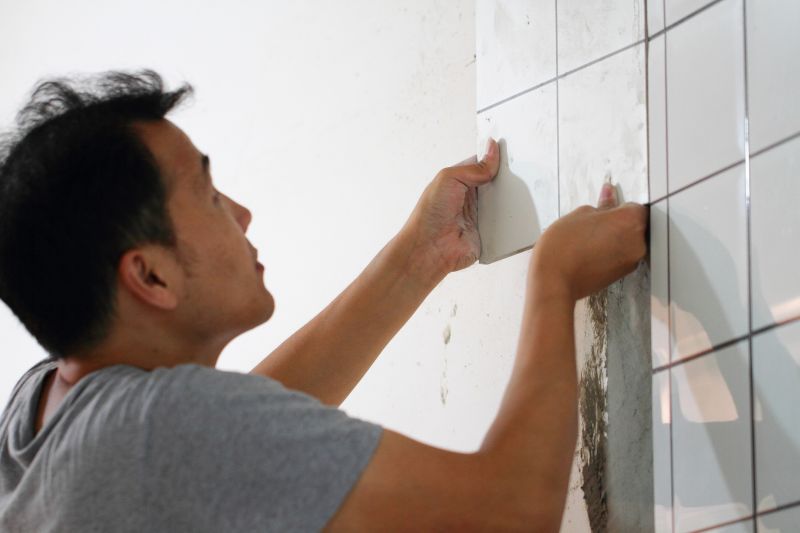
Ceramic Tiles
Versatile and easy to maintain, ceramic tiles suit various shower designs with their water-resistant properties.
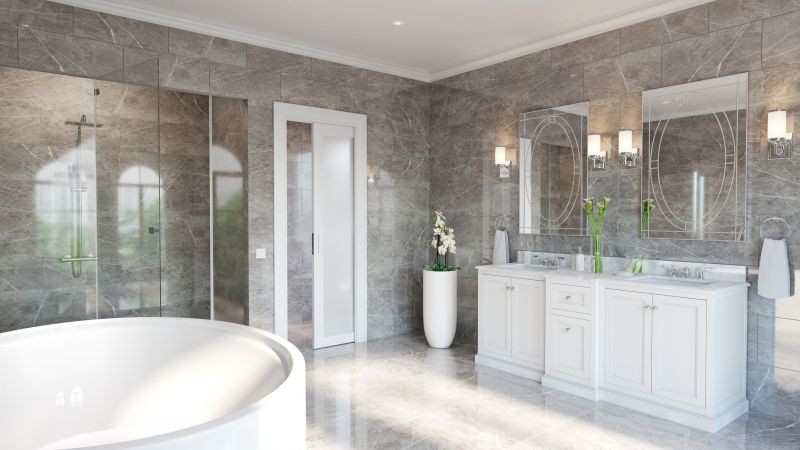
Porcelain Tiles
Durable with low water absorption, porcelain tiles mimic natural materials and are ideal for high-traffic showers.

Natural Stone Tiles
Luxurious with unique patterns, natural stone tiles require maintenance to prevent moisture damage.
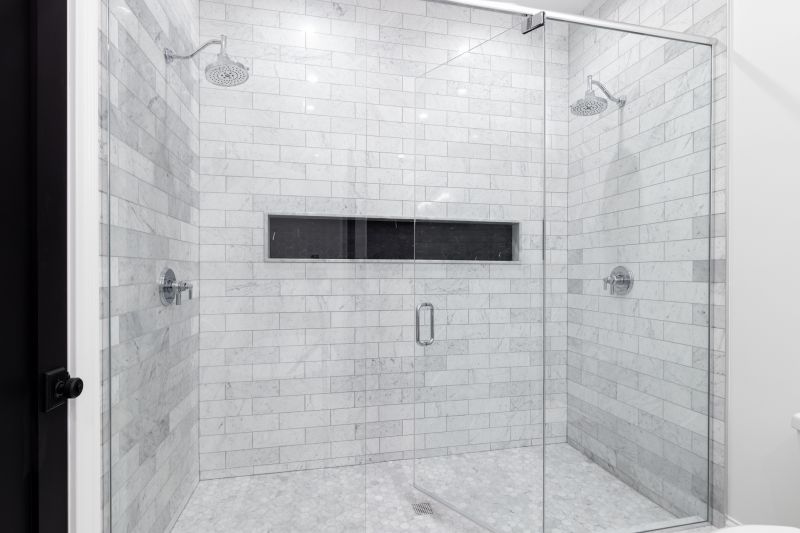
Glass Tiles
Sleek and modern, glass tiles add elegance and brightness but may need frequent cleaning.
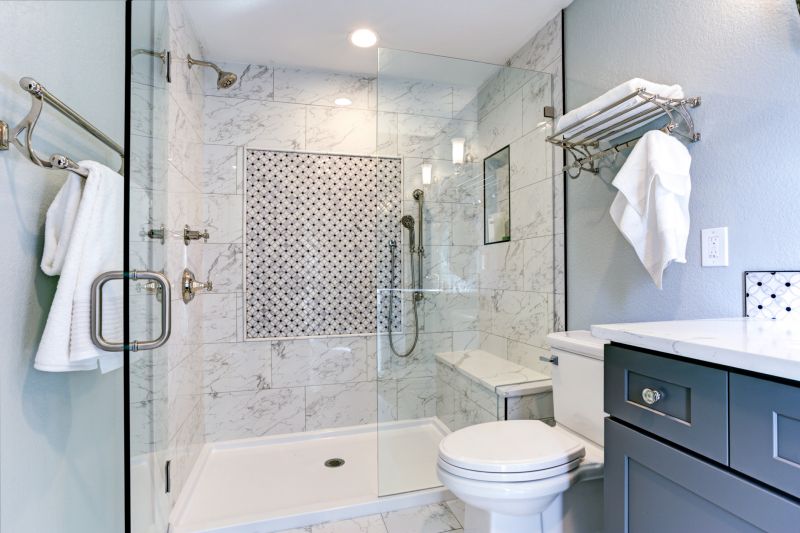
Selecting the Right Shower Tile Size and Finish
Factors to Consider for Optimal Aesthetic and Functional Results
Choosing the right shower tile involves balancing aesthetics with functionality. The size and finish of tiles can significantly impact both the visual appeal and practical performance of a shower space. Homeowners must consider a variety of factors, including the overall style of the bathroom, the level of maintenance required, and the specific attributes of different tile options.
Tile size plays a crucial role in defining the look of a shower. Large tiles can create a seamless, modern appearance by reducing grout lines, which can also make cleaning easier. Conversely, smaller tiles are often used to add texture and interest, particularly in shower floors where slip resistance is important. The choice between large and small tiles often depends on the size of the shower and the desired aesthetic effect.
The finish of the tile is another critical consideration. Glossy finishes can add a sleek, reflective quality to the shower, making it appear larger and brighter. However, they may also show water spots more readily and require frequent cleaning. Matte finishes, on the other hand, offer a more subdued look and can be more forgiving in terms of maintenance. They also provide better traction, which can be an important safety feature.
Material selection is equally important when choosing shower tiles. Porcelain and ceramic tiles are popular due to their durability and water resistance. Natural stone tiles, such as marble or slate, offer unique patterns and textures but may require additional sealing to prevent water damage. Glass tiles can add a touch of luxury and are available in a variety of colors and finishes, though they can be more fragile.
Homeowners should also consider the compatibility of tile choices with existing bathroom elements. The color and texture of the tiles should complement the fixtures, cabinetry, and overall design theme. For instance, neutral tones can create a calming spa-like atmosphere, while bold colors and patterns can make a dramatic statement.
Porcelain Tiles
Known for their strength and water resistance, porcelain tiles are ideal for high-moisture areas like showers.
Ceramic Tiles
Available in a wide range of colors and patterns, ceramic tiles are versatile and easy to maintain.
Natural Stone Tiles
Offering unique textures and patterns, natural stone tiles require sealing but provide a luxurious look.
- Glossy Finish: Reflective and bright, requires regular cleaning
- Matte Finish: Subtle and slip-resistant, hides water spots
- Large Tiles: Modern look, fewer grout lines
- Small Tiles: Textured appearance, better slip resistance
| Attribute | Details |
|---|---|
| Material | Porcelain, Ceramic, Natural Stone, Glass |
| Finish | Glossy, Matte |
| Dimensions | Large, Small |
Ultimately, selecting the right shower tile size and finish involves a balance of aesthetic preferences and practical needs. By carefully considering the attributes of different materials and finishes, homeowners can create a shower space that is both beautiful and functional, enhancing the overall value and enjoyment of their home.
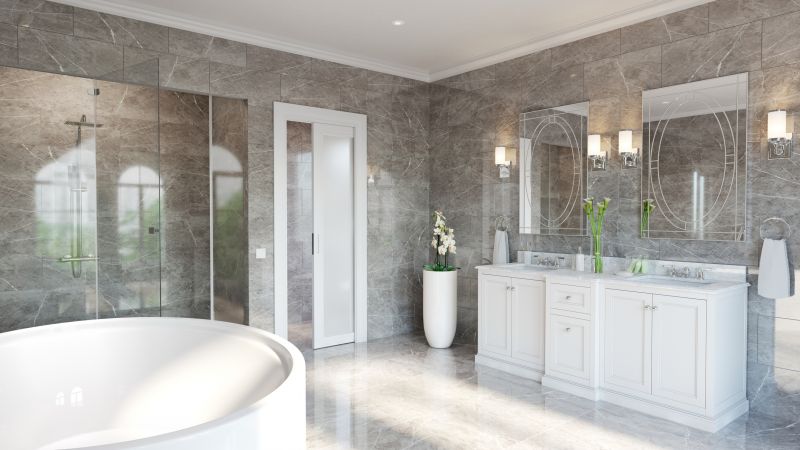
Porcelain Tiles
Strong and water-resistant, ideal for high-moisture shower areas.
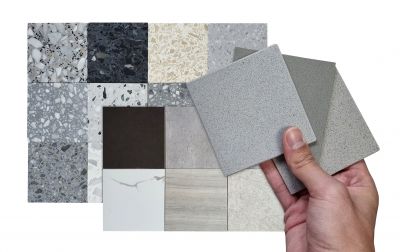
Ceramic Tiles
Versatile and easy to maintain, available in many colors and patterns.
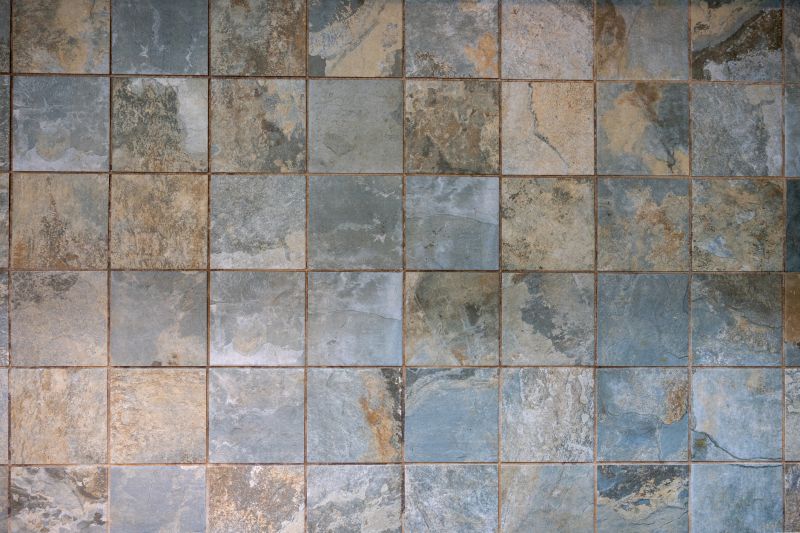
Natural Stone Tiles
Unique textures and luxurious look, require sealing for water protection.
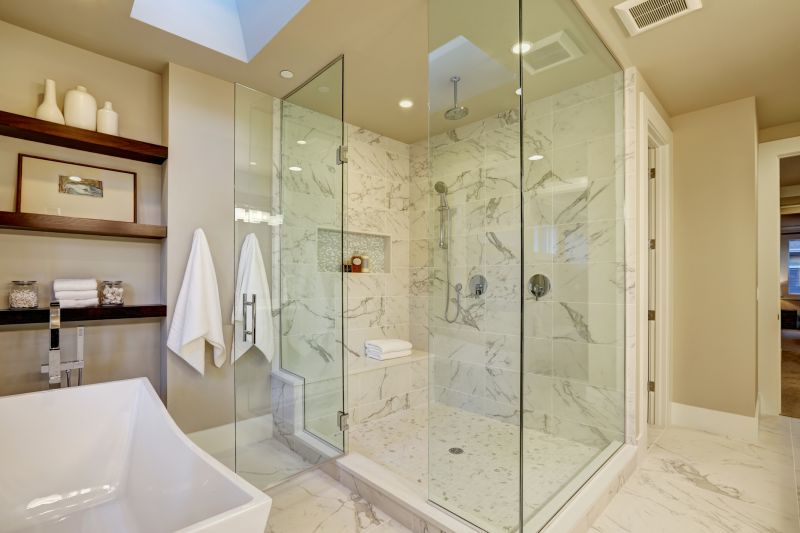
Glossy Finish
Reflective and bright, but requires regular cleaning to avoid water spots.
